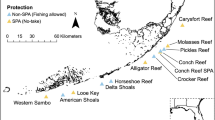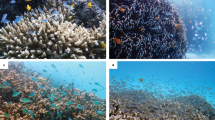Abstract
DIRECT observations reveal fish to be predators on most species of reef corals. Biting of the tip ends of branches, rasping the surface layers of the polyp, and rasping of the algae or other organisms attached to the non-living surface of the coral, are among the many methods used in obtaining the polyp of the coral and associated animals and plants as food. Direct correlations can be obtained between the occurrence of certain kinds of fish and the type of coral—a relationship which may be largely attributed to the sheltering effect of the coral. Hiatt and Strasburg1, however, found a direct relationship between the coral and fish occurrences in terms of both habitat and predation.
This is a preview of subscription content, access via your institution
Access options
Subscribe to this journal
Receive 51 print issues and online access
$199.00 per year
only $3.90 per issue
Buy this article
- Purchase on Springer Link
- Instant access to full article PDF
Prices may be subject to local taxes which are calculated during checkout
Similar content being viewed by others
References
Hiatt, R. W., and Strasburg, D. W., Ecol. Mongr., 30, 65 (1960).
Author information
Authors and Affiliations
Rights and permissions
About this article
Cite this article
SQUIRES, D. Deep Water Corals as Fish Food. Nature 203, 663–664 (1964). https://doi.org/10.1038/203663a0
Issue Date:
DOI: https://doi.org/10.1038/203663a0
This article is cited by
Comments
By submitting a comment you agree to abide by our Terms and Community Guidelines. If you find something abusive or that does not comply with our terms or guidelines please flag it as inappropriate.



